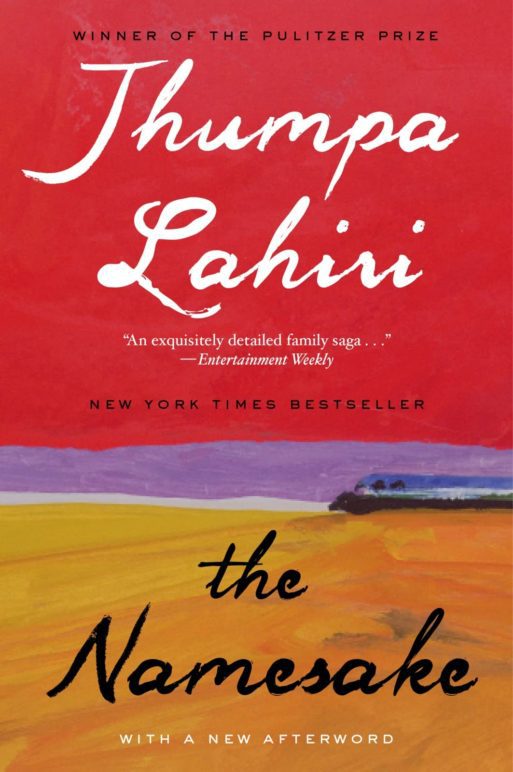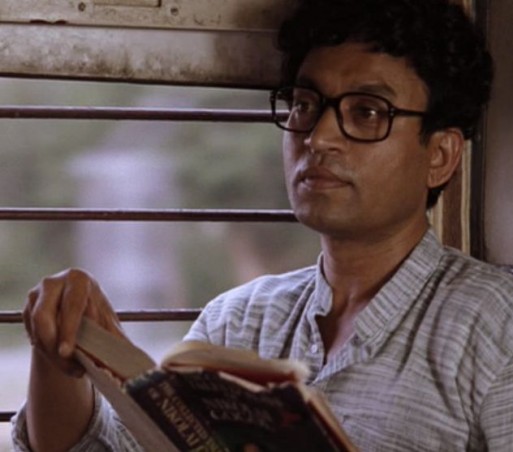 The family saga is a tried-and-true literary genre, one that usually follows a central clan as they grow, marry, have children, age and eventually die. There’s a certain rhythm to these types of stories — unlike so many other novels, they don’t focus on a particular period or event in the main characters’ lives, but rather the grand, sweeping arc of a generation or sometimes generations.
The family saga is a tried-and-true literary genre, one that usually follows a central clan as they grow, marry, have children, age and eventually die. There’s a certain rhythm to these types of stories — unlike so many other novels, they don’t focus on a particular period or event in the main characters’ lives, but rather the grand, sweeping arc of a generation or sometimes generations.
Jhumpa Lahiri’s The Namesake is such a novel. The narrative follows the Ganguli family, starting with patriarch Ashoke’s close encounter with death as a young man when he survives a train crash in his native India. On the train, he happened to be reading a book by his favorite author, Nikolai Gogol. So it is that years later, when he is living in America with his new wife, Ashima, he decides to give their newborn son the pet name “Gogol.” It soon becomes his given name, but for years little Gogol is unaware of the significance behind it.
We follow the family as Gogol grows from child to teenager, and becomes increasingly alienated from his parents’ immigrant way of doing things. He’s the quintessential first-generation American son. He never speaks to them in Bengali, and he’s embarrassed by their idiosyncrasies. He is also increasingly embarrassed by his strange name. When he turns fourteen, Ashoke gives Gogol a little volume of Nikolai Gogol stories, but Gogol barely gives it a glance. Throughout the book, the theme comes back again and again to the contentious relationship Gogol has with his name and ultimately his heritage, his birthright.
Besides this question of heritage, another one of the themes that’s very effectively dealt with is death. Ashoke’s near-death experience as a young man continues to color his understanding of the world in the decades that follow. It gives him a deep appreciation for life and for his family, including his two terribly American children.
So when Ashoke dies unexpectedly while on a business trip years later, it feels for Ashima, Gogol and his sister that it is far too soon. The shock of the experience is sparsely, skillfully expressed in Lahiri’s narrative: Ashima speaks to Ashoke on the phone after he has checked himself into the emergency room — it seems like something minor, he asks her to make a doctor’s appointment for him when he gets home. Later that evening, she is trying to reach him, and she calls the hospital to inquire after him. This is when a nurse tells her that her husband has “expired.”
Expired. A word used for library cards, for magazine subscriptions. A word which, for several seconds, has no effect whatsoever on Ashima.
‘No, no, it must be a mistake,’ Ashima says calmly, shaking her head, a small laugh escaping from her throat. ‘My husband is not there for an emergency. Only for a stomachache.’
‘I’m sorry, Mrs… Ganguli, is it?’ (168-169)
Gogol, the prodigal son, leaves his swanky, independent life in New York City to help, flying to Cleveland to claim the body and pack up his father’s temporary apartment. “Thinking of his father living here, alone these past three months, he feels the first threat of tears, but he knows that his father did not mind, that he was not offended by such things.” (174) In the apartment, Gogol finds sneakers, flip-flops, a photo of the family on the refrigerator, four plates, two mugs, four glasses, some tea and sugar and rice. He cancels the utilities, calls his father’s workplace, returns the leased car.
These mundane activities are, for Gogol, at once therapeutic and unfulfilling. After packing up all of his father’s belongings, he lies on the couch to sleep, and unable to do so, thinks about what happened to his father. “Gogol imagines his father by the door, bending over to tie his shoelaces for the last time. Putting on his coat and scarf and driving to the hospital. Stopping at a traffic light, listening to the weather report on the radio, the thought of death absent from his mind.” (178)
This blunt portrayal of losing a loved one is refreshing in its candor, no extraneous explorations of feelings or soul-searching or analyzing relationships. It’s simply how the family deals with losing Ashoke, what they think about, what they do and how they proceed. Buoyed by Jhumpa Lahiri’s lucid, lovely writing, The Namesake treats the story of the Ganguli family with respect and honesty, so that we all see ourselves in their experiences, no matter how particular — it still feels universal.
I highly recommend the book, but if you find yourself without much time to read, watch Mira Nair‘s lovely 2006 film version.
If you enjoyed this post, check out our film review The Darjeeling Limited.
Some of our book reviews:
- Kayak Morning by Roger Rosenblatt
- Truth & Beauty by Ann Patchett
- CRAZY by Amy Reed

 The Namesake, by Jhumpa Lahiri
The Namesake, by Jhumpa Lahiri



 Meaning-Focused Grief Therapy: Imaginal Dialogues with the Deceased
Meaning-Focused Grief Therapy: Imaginal Dialogues with the Deceased
 Flawed Kidney Function Test Discriminated Against Black Patients
Flawed Kidney Function Test Discriminated Against Black Patients
















My first impression about the book „The namesake“ by Đampa Lahiri
I must admit, I have not heard about Đampa Lahiri before I had read this book. My wife imposed on me to read the book with some patience , and owing to her, I really enjoyed reading it.
The story follows the destiny of one Indian family named Ganguli, which pursuing better life had moved to America.
The main characters of the book are Ašok Ganguli and his wife Ašima Ganguli, their daughter Sonja and son Gogolj who was named by the author of the book. By some tragic circumstances, Gogolj has never got his Indian name which according to their tradition should be given by his grandmother.
As his grandmother had died just before his birth, his father decided to give him the name of the famous Russian writer Gogol. Actually his name Gogolj, had been chosen long time ago, when his father Ašok had had a terrible accident on the train, in which he was reading „The overcoat“ by Nikolaj Gogolj. Thanks to that book he was found by the rescuers, who had noticed it as peering out of the rambles. When he recovered he went to America to continue his education at one of the prestigious Universities.
Although both of his parents have been very well educated, and well appreciated by the American people, they always tried to be connected with the people from India, as well as with their people who lived in America as well.
The situation, troubled Gogolj very much. He always tried to be the part of the society where he lived then, but his name, Gogolj, by his opinion, was the main cause for his uneasiness and unhappiness.
When he grew up, he decided to change his name and finally became Nikkhil.
After that, he managed to become close with one American girl. But it had not lasted long. In the beginning of that relationship he was delighted by the life and freedom in an American family. However after his father’s death, the American girl has not approved of his absence so long, and finally their relationship was broken.
The next relationship with one Indian girl led to the marriage. Nevertheless, that marriage ended disastrously, as he had discovered that she has been unfaithful for a long period.
My modest opinion both about the book and the writer is delight. Đampa managed to convey the real life of an ordinary Indian family, their struggles, their falls, but at the end, the conclusion is very simple, they could not have been the real American people. They are Bengali, and they will be it for ever.
It is both the novel about the identity tracking and in some way about loses, which shows that only permament is pursuing of happiness.
By Mr.Kovacevic
Report this comment
I find this book boring too..
Report this comment